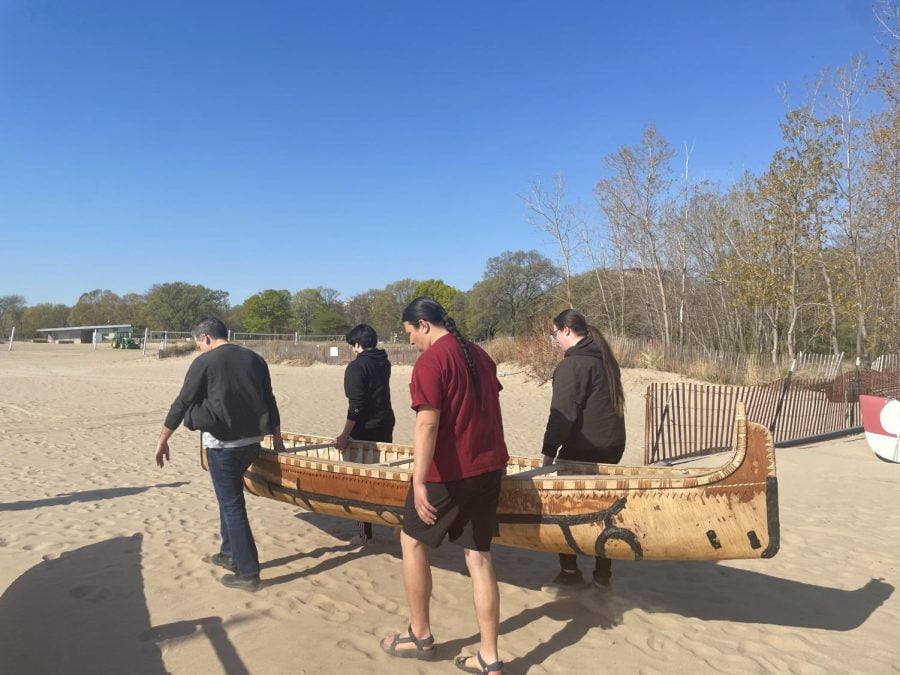Indigenous community members release birch bark boat into Lake Michigan
Jay Dugar/Daily Senior Staffer
Four people are carrying a handcrafted birch bark canoe from the Northwestern Sailing Center to the shore of Lake Michigan. The canoe was released for a brief trip on the lake, before being taken to the Segal Visitors Center.
May 8, 2023
Indigenous students and community members gathered at the beach outside the Northwestern Sailing Center on Friday morning to launch a hand-crafted birch bark canoe for its inaugural trip on Lake Michigan.
Indigenous community members took the canoe for a roughly five minute long trip in Lake Michigan before returning it to the shore to be placed in the Segal Visitors Center.
More than 100 people helped hand-craft the canoe in 2021 under the leadership of then Center for Native American and Indigenous Research artist-in-residence Wayne Valliere. Valliere, who is Lac du Flambeau Ojibwe, is a birchbark canoe builder and artist.
The canoe released Friday was originally supposed to launch in October 2021. However, windy conditions prevented Valliere, his team of apprentices and members of the NU and Evanston community from releasing the craft.
Medill Prof. Patty Loew, former director of CNAIR, helped organize the canoe launch. Loew, who is a member of the Bad River Band of Lake Superior Ojibwe, said canoes are integral to the identity of the Ojibwe people. The canoe’s launch is a way to bring the community together, she said.
“Building a canoe in an area that was deeply Indigenous, has always been Indigenous and hopefully will always stay Indigenous was such a powerful act,” Loew said. “It really was empowering for all of us.”
Director of Native American and Indigenous Affairs Jasmine Gurneau, who is a descendant of the Menominee Nation and is enrolled with the Oneida Nation, also helped organize the event.
Gurneau, who grew up on Lake Michigan, believes the canoe itself is an important reminder of the indigenous presence in the Evanston and Northwestern communities.
“This canoe represents our connection to each other,” Gurneau said. “That’s why it’s so important that it be in the visitor center, because this should be the first thing that visitors see when they come to Northwestern. It reminds them, and all of us, that native people have a presence here.”
The canoe’s launch site sits on the traditional homelands of the people of the Council of Three Fires — the Ojibwe, Potawatomi and Odawa — and the Menominee, Miami and Ho-Chunk nations.
Before the canoe was taken into the lake, SESP Prof. Megan Bang, who is of Ojibwe descent and is acting director of CNAIR, spoke on the canoe’s significance.
Indigenous people remain present in Chicago, Bang said, even though the state fails to represent their interests.
“We’re here now, and we will always be here. Our policy makers may not be remembering that so well,” Bang said. “We have a number of legislative agendas, but hopefully there will be good news not very long from now.”
Bang said the state of Illinois should implement a recognized Indigenous Peoples’ Day and be required to teach Indigenous history in K-12 schools.
She added that some policy victories should be celebrated, like the guaranteed right of Indigenous students to wear tribal regalia at their graduations.
“What I think about this beautiful canoe and what it brings back for us is, it’s kind of an act of revitalization,” Bang said. “It’s not just the canoe, it’s all of the culture that comes with it.”
Third-year Feinberg student Kayla Giger, who is an enrolled member in the Sagamok First Nation, was one of multiple people to ride the canoe as it was rowed into Lake Michigan, which she described as a valuable opportunity.
Giger added she has experience on the water and did crew in college. But she said she felt riding in the canoe was fundamentally different from her past boating involvement.
“It felt so different. It was stable,” Giger said. “(It was) a very unique experience, where you just feel very close to the water and close to the canoe.”
Correction: A previous version of this story misstated Patty Loew’s position at the Center for Native American and Indigenous Research. She is the former director of CNAIR and Megan Bang is the acting director. The Daily regrets the error.
Email: jaydugar2025@u.northwestern.edu
Twitter: @dugar_jay
Related Stories:
— NAISA commemorates 158th anniversary of the Sand Creek Massacre, reiterates demands to NU
— Indigenous healthcare professional and student discuss their journeys in the healthcare field
— Combatting erasure: How to craft a Land Acknowledgement on Northwestern’s campus



